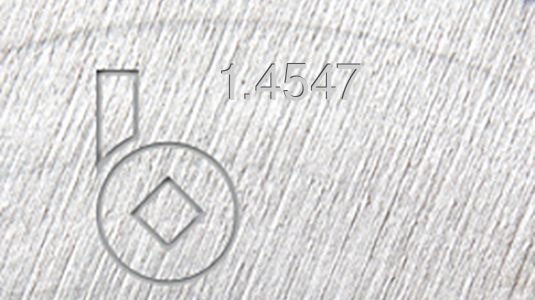Material 1.4547
Stainless steel
1.4547 is ann austenitic stainless steel. Based on its excellent corrosion-resistance paired with good mechanical properties its often being used in theoffshore technology as well as the chemical industry. Typical prefabricated parts are valve bodies, bolts and pump shafts. It is also often being used in the construction of swimming pool facilities, especially in areas with salt water, i.e. brine baths. Its got this characteristic feature due to its high molybdenum value with added nitogen. Molybdenum is an important alloying element for corrosion-resistance. The added nitogen increases the structural strength without adverse influence on the toughness. The PREN-value of 1.4547 is ranged between 42,4 and 47%. The PREN-value indicates the corrosion-resistance of a stainless steel. Starting at 32% a steel is considered resistant against sea water. The PREN-value can be reached with the formula: %Cr + 3,3xMo + 16x%N
Do you have any questions about the material or would you like to order? Complete our inquiry form, it`s free of charge and without obligation. We will get in touch with you in order to provide you with more information.

Standards
| HDIN / EN | US-Standard | AFNOR | UNI | JIS | request |
|---|---|---|---|---|---|
| X1CrNiMoN20-18-7 X1CrNiMoCuN20-18-7 EN10088-3 | UNS S31254 ASTM A182F44 ASTM A276F44 ASTM A479F44 | request |
Material Category: Stainless steel
Chemical Composition
| C % | Si % | Mn % | P % | S % | Cr % | Cu % | Mo % | N % | Ni % |
| max 0,02 | max 0,70 | max 1,00 | max 0,030 | max 0,010 | 19,50 - 20,50 | 0,50 - 1,00 | 6,00 - 7,00 | 0,180 - 0,250 | 17,50 - 18,50 |
Mechanical Properties
| Warmgewalztes Blech | |||||||
| lösungsgeglüht | 0,2% Dehngrenze (Rp0,2) | 1% Dehngrenze (Rp1,0) | Zugfestigkeit (Rm) | Bruchdehnung (A5, 65) | Härte [HBW] | Kerbschlagarbeit KV (ISO-V/Charpy-V) | Probenlage |
| 160 - 400 mm | >= 30 % | <= 260 HBW | >= 60 Joule | längs | |||
| <= 160 mm | >= 35 % | <= 260 HBW | >= 60 Joule | ||||
| 160 - 400 mm | >= 300 N/mm² / ~ 20 ° C | >= 340 N/mm² / ~ 20 ° C | >= 650 - 850 N/mm² / ~ 20 ° C | >= 100 Joule | |||
| <= 160 mm | >= 300 N/mm² / ~ 20 ° C | >= 340 N/mm² / ~ 20 ° C | >= 650 - 850 N/mm² / ~ 20 ° C | >= 60 Joule | |||
| >= 148 N/mm² / ~ 500 ° C | >= 180 N/mm² / ~ 500 ° C | >= 495 N/mm² / ~ 500 ° C | |||||
| >= 153 N/mm² / ~ 450 ° C | >= 184 N/mm² / ~ 450 ° C | >= 502 N/mm² / ~ 450 ° C | |||||
| >= 160 N/mm² / ~ 400 ° C | >= 190 N/mm² / ~ 400 ° C | >= 510 N/mm² / ~ 400 ° C | |||||
| >= 165 N/mm² / ~ 350 ° C | >= 195 N/mm² / ~ 350 ° C | >= 517 N/mm² / ~ 350 ° C | |||||
| >= 170 N/mm² / ~ 300 ° C | >= 200 N/mm² / ~ 300 ° C | >= 525 N/mm² / ~ 300 ° C | |||||
| >= 180 N/mm² / ~ 250 ° C | >= 212 N/mm² / ~ 250 ° C | >= 542 N/mm² / ~ 250 ° C | |||||
| >= 190 N/mm² / ~ 200 ° C | >= 225 N/mm² / ~ 200 ° C | >= 560 N/mm² / ~ 200 ° C | |||||
| >= 205 N/mm² / ~ 150 ° C | >= 245 N/mm² / ~ 150 ° C | >= 587 N/mm² / ~ 150 ° C | |||||
| >= 230 N/mm² / ~ 100 ° C | >= 270 N/mm² / ~ 100 ° C | >= 615 N/mm² / ~ 100 ° C | |||||
Material request
![[Translate to Englisch:] [Translate to Englisch:]](/fileadmin/bilder/slider/Werkstoffe/basedo_stahlrohre_werkstoffe.jpg)
![[Translate to Englisch:] [Translate to Englisch:]](/fileadmin/bilder/slider/Werkstoffe/HeaderWerkstoffe.jpg)
![[Translate to Englisch:] [Translate to Englisch:]](/fileadmin/bilder/slider/Werkstoffe/HeaderWerkstoffe2.jpg)
![[Translate to Englisch:] [Translate to Englisch:]](/fileadmin/bilder/slider/Werkstoffe/HeaderWerkstoffe4.jpg)